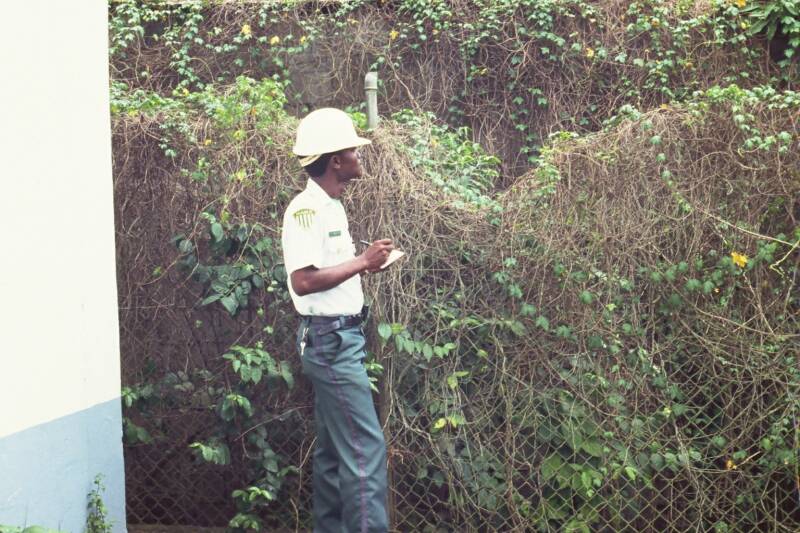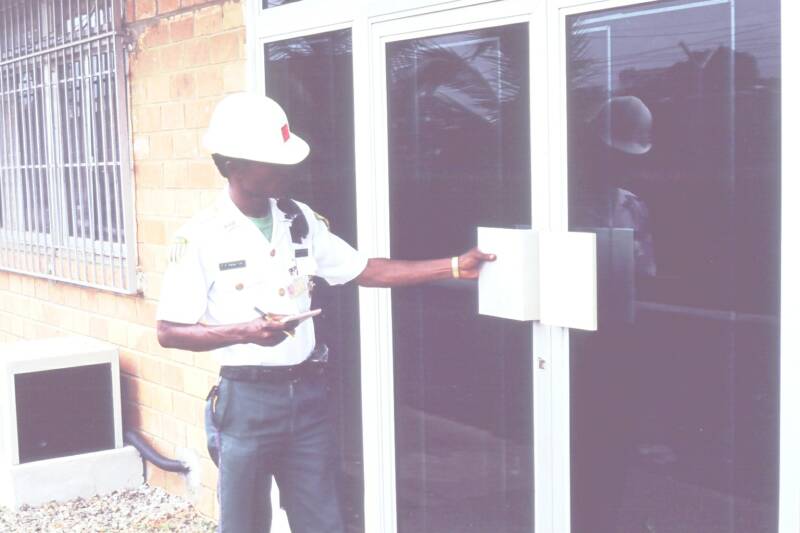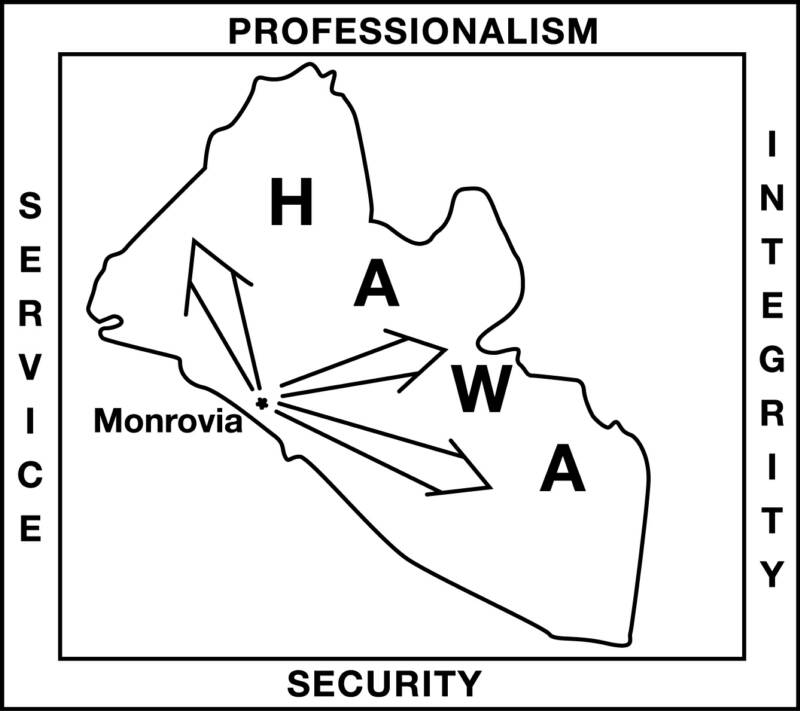Training
We provide additional training through memorandum, handouts (Hip Pocket Training), lectures, hands-on activities, classroom participation videos/DVDs, Internet security briefings, tests and news articles. We also perform informal training during site visits, and post inspections. Following are some of the subjects in which HAWA Security, Inc. guards receive training:
Use of Force: The officers learn the five steps associated with force continuation. Students are taught the definitions of reasonable force, excessive force, and deadly force. Students are taught to try to de-escalate situations, and understand how their actions or comments can escalate a situation that has already been de-escalated. Students are taught about civil and criminal liabilities for any over zealous actions.
Crimes and Offenses: The officers learn the definition of a crime, and knows the difference between a felony and a misdemeanor. Students learn how American Jurisprudence is derived from English Common Law. Students learn the nine common law felonies.
Bomb Threats: The officers learn what to do when they receive a telephone bomb threat. They learn the importance of the bomb threat checklist. They learn about suspicious packages. Classroom activities include actual telephone role playing, and breaking up into groups to simulate a search teams.
Terrorism Awareness/Deterrence Training: The students learn that terrorism instills perpetual fear and that terrorism can be domestic as well as international. To combat terrorism, we teach officers how to make use of their powers of observation.
Sabotage: The officers learn that that are three types of sabotage. They learn that there is incendiary, explosive and mechanical sabotage. Officers learn that sabotage is done to get even, or cause serious property damage.
Espionage: Officers learn that espionage is done for money. Employees or other interested parties steal or collect vital information, and sell that information to other people or countries. Espionage can cause grave damage to the security of the United States. Students are introduced to the explanations of classified, secret and top-secret information. They are taught that information gatherers can use a little bit of information from a lot of people to get the “whole picture.”
Traffic Control: Students learn how important it is to properly use the whistle, hand signals, and eye contact when directing traffic. More importantly, today, officers are taught to pay attention to trucks or other vehicles that are unattended, taking notes and reporting all suspicious activity.
Dangerous Drugs: Students learn that narcotics are not the only dangerous drugs. Students learn how dangerous alcohol, caffeine, nicotine and over the counter and prescription drugs abuse affect people. Discussions include the derivatives of drugs, problems associated with alcohol abuse, drug use, marijuana, pills, cigarettes and caffeine.
Crime Scene Protection: The key points to learn in this topic are to survey the scene, render aid to the injured, call for resources and protect evidence from contamination. Students learn that there can be more than one scene of a crime. Students understand that the definition of a crime scene is the place where the crime occurred.
Rules of Evidence: The key points are that evidence is any material that has a connection to the crime scene and may prove guilt or innocence. Students learn about the chain of custody, and the types of evidence, and their important role in this process.
Handcuffing: Students learn the handcuffing techniques associated with high risk, (prone) medium risk, (kneeling) and low risk (standing). Students actually perform hands-on training.
Defensive Tactics: Students learn blocks, kicks, take downs, and come along techniques. This is a hands-on class, and is usually three hours long. Safety is highly stressed during these sessions.
Search and Seizure: The key point in this topic is that the officers understand the Liberian Laws. Students are introduced to land mark Supreme Court cases such as the Davises case on search and seizure. Students learn important phrases such as fruits of a the poisonous tree, plain view search, and search incident to a lawful arrest. Students get hands on experience performing body searches and frisks. Weapons are planted on selected people to show where and how people hide weapons.
Crowd Control: Students learn the types of crowds, and what changes one type of crowd into another. Students learn the difference between a friendly, hostile, and agitated crowd. Students learn the difference between a mob, a riot, a demonstration and civil disobedience.
Baton Training: Students learn nomenclature, defensive blocks, three types of draws, where to strike or not to strike on the body of an aggressor and three grips. This program eventually leads to crowd formations, and control.
Patrol Methods: Students learn the types of patrols such as mobile, foot, and the advantages and disadvantages of both. Students learn the importance of using patrol tools such as pen and paper, flashlights, and radios. Students learn how to “survey the scene,” the use of cautious sense and intuition, and the importance of documentation and notification.
Fire Prevention: Students become familiar with the types of fires and the types of fire extinguishers. They learn sprinkler systems, and components of the fire alarm system. Students learn how to identify fire hazards while on patrol. This training also consists of recognizing Chemical, Biological and Nuclear hazards.
Blood Borne Pathogens: Students are cautioned to use gloves when treating accident victims to prevent the spread of diseases transmitted by body fluids. This class explains how the HIV virus is contacted and spread, the different types of hepatitis, tuberculosis, and the need for protective clothing, latex gloves and mask to avoid contamination of themselves or their families. Students understand that not only are there blood borne pathogens, but pathogens and diseases are also spread by water and air.
CPR and First Aid: Classes are conducted by certified Red Cross Instructors. Topics include rescue breathing, taking care of burn victims, one-man and two-man CPR, first responder requirements, dealing with extreme temperatures, such as frost bites, or heat exhaustion, and recognizing and understanding when and how the body goes into shock. Students receive certification cards after successful completion.
Flying the Flag: That the flag is flown from sunrise to sunset. Students learn how to raise, fold, and store the flag. Students learn what half-mast is and who determines when a flag is flown at half-mast.
Human Behavior: Students learn the many problems associated with the human mind. They learn several kinds of phobias, and understand that mental illness is a leading medical problem and that the guard on post will come in contact with some of these people. We talk about schizophrenia, paranoia, and manic depression and other manias.
Ethics: We teach that ethics is a self imposed or organizational set of standards. Students learn that ethics is doing the right thing when no one is looking. Students devise their own Code of Ethics. We talk about professionalism; public relations and the students develop an Oath of Office for security guards.
Communications: Students learn the components of any form of communication. They learn the ABC’s of writing, and the importance of the 5 W’s and 1 H: who, what, where, why, when, and how. They learn that communications is a medium of exchange, and that there is a sender, message, receiver and a media. Students are taught oral communication skills, written communication skills, and non-verbal
communications. Students learn the phonetic alphabet, a sampling of 10-codes, radio communication skills. Radio nomenclature: the history of the Liberian Telecommunications Laws, penalties for profanity and the ABC’s of Radio Communication.
Arrest Procedures: Students learn about the pre arrest warnings, probable cause, and searches. They actually practice performing an arrest, using the techniques that learned from their hand-cuffing and search and seizure classes.
Fire Arms Training: HAWA Security, We do not provide the training or use of this kind of weapon in our company.
It is additionally noted here that the licensing authority the Ministry of Justice (MOJ), requires all security officers to adhere to all GOL regulations and General Orders that are passed.
In the event that a felony is committed in the presence of the assigned guard and the decision is made to apprehend the subject the provisions of the “Eyes and Ears Rule” are applicable and protect the officer, our client and government in the event the pursuit goes off the installation.
Once the guard is certified and placed on post, the compliance officer tracks the guard’s suitability. In suitability, a number of items are required, and they expire at different times throughout the year. In order to maintain all these different expiring records, HAWA Security, Inc. has created a computerized tracking system identifying what employees are in need of what particular re-certification, additional training, and license renewal. Our records matrix tracks all these requirements, plus CPR and first aid, license renewal training, weapons qualifications, and medical evaluations, just to name a few.
Our certification and licensing records matrix is maintained in HAWA Security, Inc’s administrative system. Our supervisors schedule personnel for all required re-certification. The “Terrorism Deterrence and Awareness” training courses use the most up to date materials provided by the Ministry of Justice, Homeland Security.
Please note that the above courses are not all inclusive and are subjected to change according to the training needs of HAWA security clients. Many more courses are being added and subtracted from time to time to reflect the growing changes in the security requirement posed by threats against the Liberian economy.



